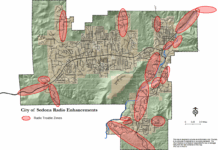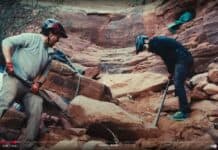If voters approve it in November, a proposed citizen initiative could fundamentally change Arizona’s electoral process by sending the top two candidates into the general election regardless of their party affiliation.
The Open Elections/Open Government Act initiative would give all voters, regardless of their party registration, the ability to vote on all the candidates in the primary election. The top two vote-getters would then face off in the general election.
The initiative’s founder, former Phoenix Mayor Paul Johnson, will present the proposal at the League of Women Voters of Sedona-Verde Valley’s luncheon on Saturday, Feb. 11.
The current state-level election process is similar to the federal process: Partisan candidates run against each other until the primary election, when the parties’ registered voters choose their best single nominees, who then face each other in the general election.
The initiative is similar to one passed by California voters in 2010.
In most Arizona counties and legislative districts, one party dominates the electorate and opposition parties often do not nominate a candidate. Primary elections are typically determined by a small number of loyal party voters, who can nominate more extreme candidates of the party or those tied to party leadership or special interests, according to the initiative’s supporters. If there are no candidates from other parties, those nominees win no-contest elections and serve the whole electorate.
More moderate voices have had some influence since 1998 when Arizona legislators opened the primaries, according to the Morrison Institute for Public Policy at Arizona State University. Arizona has what’s known as a partially closed or semiclosed primary, meaning registered independents can participate in either, but not both, of the Democratic or Republican primaries. Arizona is one of 13 states with a partially closed primary. A totally closed primary is the law in 11 other states.
More open primaries has boosted voter participation. In 1998, when Arizona primaries were still closed, turnout was 19.6 percent, but rose to 24 percent by 2000, according to the Morrison Institute. Turnout for the 2010 primaries was around 30 percent.
The initiative would end the ability of a small group of partisan voters to choose state leaders by allowing voters on all sides of the political spectrum to vote on all candidates.
In a 2010 Morrison Institute poll, 74 percent of responders agreed or strongly agreed that there was too much partisan conflict at the Arizona State Capitol and 67 percent expressed agreement or strong agreement with the sentiment, “I would like to see more moderate candidates elected to public office.”
“I’m in favor of having more voters have a voice in our government,” Yavapai County District 3 Supervisor Chip Davis said. “Right now in Yavapai County, everybody running is all of the Republican side.”
“The system is set up so the candidates come from the hard right or the hard left, but most citizenry has a more mainstream view on things. Coming out of the primary, when your two choices are either a hard right or a hard left, the citizenry has to decide what’s a reasonable candidate,” Davis said. “A lot of our seats are not partisan in what they do.”
The initiative would make state-level elections like many municipal elections, which have been almost universally nonpartisan due to legislation passed for major cities in 2008, then all the state’s municipalities in 2009.
The only holdout, Tucson, will stand before the Arizona Supreme Court later this year to keep its partisan affiliations on its City Council ballots. Although considered a Democratic bastion, Republican Bob Walkup served three terms as mayor until declining to run for a fourth term in 2011.
However, unlike city elections, each candidate for state office will have the option of indicating his or her party on the ballot.
One drawback noted by opponents is the ability of voters to easily identify a candidate’s values by their party affiliation meaning candidates may have to spend more money in campaigns to help with name recognition, according to the Morrison Institute.
To place the constitutional amendment on the November ballot, the campaign needs to collect 259,213 signatures of qualified voters by July. About 70,000 have already signed, according to the campaign’s website.
Johnson, the initiative’s founder, served on Phoenix City Council from 1985 to 1990, then a term as Phoenix mayor from 1990 to 1994. His speech to the League of Women Voters of Sedona-Verde Valley’s luncheon takes place at Agave of Sedona, 1146 W. SR 89A, at noon, Saturday, Feb. 11.
The lunch costs $30 and the league requests reservations be made with Donna Pratt at 282-6428 no later than Tuesday, Feb. 7.
The league is a nonpartisan political organization dedicated to study and action on important issues, voter education and community service.



















